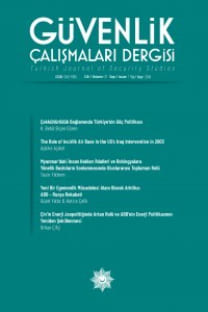Uluslararası İlişkilerde Hegemonya Kavramına Neo-Gramscian Katkı: Kuramsal Bir Analiz
Hegemonya kavramı hem pozitivist hem de post-pozitivist yaklaşımların sıkça başvurduğu bir kavram olarak Uluslararası İlişkilerin temel kavramlarından birisidir. Ancak uluslararası ilişkileri anlamak ve anlamlandırmak için sıkça kullanılmasına rağmen kavramın anlamı üzerinde bir görüş birliği mevcut değildir. Buradan hareketle, eldeki bu çalışma merkeze neo-Gramscian yaklaşımı alarak hegemonya kavramının Uluslararası İlişkiler disiplini içerisinde hangi manalara geldiğini ortaya koymaktadır. Birinci bölümde, ana akım yaklaşımların hegemonya kavramını materyal minvalde nasıl ele aldığı tanıtılmaktadır. İkinci bölümde hegemonya kavramına neo-Gramscian bakış açısının yaptığı katkılar tartışılacaktır. Son bölümdeyse neo-Gramscian yaklaşımının baskın ve bağımlı gruplar arasındaki düşünsel faktörleri de analize dâhil ederek hegemonya kavramının tanımını genişletip kavramın uluslararası ilişkilerdeki hegemonik düzeni açıklamadaki kapasitesini arttırdığını iddia edilmektedir
Anahtar Kelimeler:
Hegemonya, Realizm, Liberalizm, Neo-Gramscian Yaklaşım, Cebir, Rıza.
Neo-Gramscian Contribution on the Concept of Hegemony in International Relations: A Theoretical Analysis
The concept of hegemony is one of the central concepts in International Relations as both positivist and post-positivist approaches have been utilizing the concept within their theoretical frameworks. However, looking at how theories are utilizing the concept it is obvious that there is a lack of consensus on the meaning of hegemony. By taking this as its starting point, this article aims to explore the concept of hegemony in the discipline from different perspectives with a specific emphasis on the neo-Gramscian approach. In the first section, a brief introduction on the materialistic and static understanding of hegemony in mainstream approaches, is presented. Then in the second section, there is a discussion on the neo-Gramscian contribution on the concept of hegemony. In conclusion, the article argues that neo-Gramscian approach to understand hegemony enriches the concept by adding up ideational elements on the sociological process through which social forces establish exploitative relationship patterns
Keywords:
Hegemony, Realism, Liberalism, Neo-Gramscian Approach, Coercion, Consent,
___
- Bieler, Andreas and Morton, Adam David, (2000), “A Critical Theory Route to Hegemony, World Order and Historical Change: Neo-Gramscian Perspectives in International Re- lations”, Journal for the Theory of Social Behaviour, Vol. 30, Issue 2, pp.85-113.
- Bieler, Andreas and Morton, Adam David, (2003), “Theoretical and Methodological Chal- lenges of neo-Gramscian Perspectives in International Political Economy”, Internati- onal Gramsci Society Online Article, January 2003, pp.1-5.
- Cox, Robert, (1981), “Social Forces, States and World Orders: Beyond International Rela- tions Theory”, Millennium, Vol. 10, Issue 2, pp.126-155.
- Cox, Robert, (1989), “Production, The State and Change in World Order”, Ernst-Otto Czemniel and James N. Rosenau (eds.), Global Changes and Theoretical Challenges: Approaches to World Politics for the 1990s, Toronto: Lexington Books, pp. 37-50
- Cox, Robert, (1992), “Towards a Post-hegemonic Conceptualization of World Order: Ref- lections on the Relevancy of Ibn Khaldun”, James N. Rosenau and Ernst-Otto Czem- piel (eds.), Governance without Government: Order and Change in World Politics, Cambridge: Cambridge University Press, pp. 132-160.
- Fontana, Benedetto, (2002), “Gramsci on Politics and State”, Journal of Classical Socio- logy, Vol. 2, Issue 2, pp.157-178.
- Germain, Randell and Kenny, Michael, (1998), “Engaging Gramsci: International Relati- ons Theory and The New Gramscians”, Review of International Studies, Vol. 24, Issue 1, pp. 3-21.
- Ghosh, Peter, (2001), “Gramscian Hegemony: An Absolutely Historicist Approach”, His- tory of European Ideas, Vol. 27, pp.1-43.
- Gilpin, Robert, (1981), War and Change in World Politics, Cambridge: Cambridge Uni- versity Press.
- Gramsci, Antonio, (1971), Selections from the Prison Notebooks, (Translated by Q. Hoare and G. Nowell Smith), New York: International Publishers.
- Hobden, Stephen and Jones, Richard Wyn, (2001), “Marxist Theories of International Relations”, John Baylis and Steve Smith (eds.), The Globalization of World Politics, Oxford: Oxford University Press, pp.200-223.
- Keohane, Robert, (1984), After Hegemony: Cooperation and Discord in the World Politi- cal Economy, Princeton: Princeton University Press.
- Kindleberger, Charles P., (1973) The World in Depression 1929-1939, Berkeley: Univer- sity of California Press.
- Mearsheimer, John, J., (2001), The Tragedy of Great Power Politics, New York: W. W. Norton&Company.
- Merriam-Webster Dictionary, (2018) ‘hegemon’, available at: https://www.merriam-webs- ter.com/dictionary/hegemon, (Accessed on February 1, 2018).
- Merriam-Webster Dictionary, (2018) ‘hegemony’, https://www.merriam-webster.com/dic- tionary/hegemony, (Accessed on February 1, 2018).
- Moravcsik, Andrew, (1997), “Taking Preferences Seriously: A Liberal Theory of Internati- onal Politics”, International Organizations, Vol. 51, Issue 4, pp.513–553.
- Morton, Adam David, (2003), “Social Forces in the Struggle over Hegemony: Neo-Gram- scian Perspectives in International Political Economy”, Rethinking Marxism, Vol. 15, Issue 2, pp.153-179.
- Özçelik, Sezai, (2005), “Neorealist and neo-Gramscian Hegemony in International Rela- tions and Conflict Resolutions During the 1990s”, Ekonomik ve Sosyal Araştırmalar Dergisi, Issue 1, pp.88-114.
- Snidal, Duncan, (1985), “The Limits of Hegemonic Stability Theory”, International Orga- nizations, Vol. 39, Issue 4, pp.579-614.
- Waltz, Kenneth N. (1979), Theory of International Politics, Reading, MA: Addison-Wes- ley Publishing Company.
- Wolhforth, William, C, (1993), The Elusive Balance: Power and Perceptions during the Cold War, Ithaca, NY: Cornell University Press.
- ISSN: 2148-6166
- Başlangıç: 2000
- Yayıncı: Polis Akademisi Başkanlığı
Sayıdaki Diğer Makaleler
İran’da Silahlı Muhalefetten Demokrasi Söylemlerine: Halkın Mücahitleri Örgütü
Uluslararası İlişkilerde Hegemonya Kavramına Neo-Gramscian Katkı: Kuramsal Bir Analiz
Ulusal Güvenliğin Optimal Devletini Sağlamak
Toplumsal Bütünleşme Kapsamında Terörizmle Mücadeleye Yönelik Tutumlar ve Davranışlar
